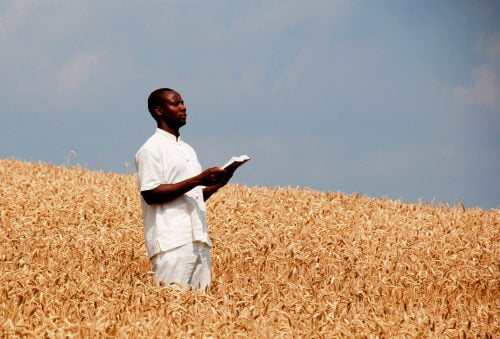When I was 18 (and a nominal Catholic), my confessor told me something surprising. He thought that it was not necessary to come to confession every week. I took things a step further and decided not to go to church at all. I would make religion a private matter.
About this time a friend gave me a Bible as a gift, and I started reading. I didn’t understand what I was reading, but the stories in Genesis made a big impression on me. I enjoyed reading and rereading them. Three years later I decided to explore my country armed with my guitar and some books, including my Bible. At a youth hostel I met a young Adventist my own age. Somehow we started a conversation about religion. This conversation grew into a three-month journey of wonderful discoveries with my new friend that changed my life forever.
A Personal Journey
My friend had several books with him and lent me a book entitled Messages to Young People. This book didn’t immediately become a favorite, as it seemed to contradict my (then) current lifestyle. What did catch my attention was another book entitled Maranatha. It clearly was a favorite with my friend, and he read it every morning for something he called “morning devotions.” Intrigued, I borrowed the book and began reading it too. This little book opened not only windows but huge doors for me. I learned about Jesus’ second coming, unmerited grace, and forgiveness. I also heard the call to obey God’s commands. I learned about the remnant and made the most marvelous discovery—I met Jesus. I accepted Him as my Savior and made Him the center of my life.
I then decided to accompany my friend to a local church to see what this “keeping the Sabbath” was all about. That first Sabbath would become a way of life that would continue for the next 33 years.
As I studied further I understood that Sabbath was created differently from the other six days. I realized that on Sabbath something special had happened that differentiated it from the other six days of Creation. God stopped His creative work and rested on that first Sabbath so that He could spend quality time with our first parents. What a sublime appointment! In the beginning God blessed the Sabbath day. He separated it and filled it with joy and a sense of festivity.
The first Sabbath was a day of praise to the Creator and a commemoration of the creation of our world. In this sense the Sabbath has something that the other days don’t have. It is not only what we don’t do on this day that makes it special, but also what God can do with us on this day that makes it a day of delight.
Sabbath Rest
No other of the six days of the week can function as a Sabbath, because only the seventh day is a memorial of Creation established by the Creator as a pact with the people He had created. He sanctified and blessed this relationship with the first humans by means of this special time.
The seventh day is the only day of the week that has a name in Scripture. The other days are named in relation to the Sabbath. There is the first day after the Sabbath or the day of preparation for the Sabbath (Luke 23:54; 24:1). It is only the seventh day that God calls His day. Jesus identifies Himself as Lord of the Sabbath (Mark 2:27, 28). Jesus does not specifically claim Lordship of all the days of the week or just any day of the week. In this sense human beings are masters of the six days of the week (Gen. 1:28), but on Sabbath human beings recognize the Lordship of God—as the Lord of all.
The Sabbath is a true gift of God to humanity (Mark 2:27). It was the first complete day that Adam and Eve spent as children of God and their first day as a married couple (Gen. 2:1-3). On Sabbath we stop worrying about our daily struggles (Ex. 20:8-11). We do not just rest any day of the week would do as a day of rest. The difference between this day and any other day is that the Sabbath offers a rest not for inactivity but rather to undertake different activities similar to the first Sabbath in Eden. Sabbath is the moment to catch our breath (Ex. 31:17) as we change activities.
Interestingly, Jesus criticizes the inactivity that the religious leaders of His time tried to impose on the Sabbath and affirmed: “My Father has been working until now, and I have been working” (John 5:17). He, of course, refers to Sabbath work as being redemptive and not the type of daily labor we normally engage in during the week (Matt. 12:7). God’s idea of rest for us frees us from ourselves and our worries so that we can have time and space for different activities. According to Jesus, Sabbath is the ideal day for blessing others (verses 9-14). It’s a day of a change in activities centered on God meeting humanity—those He formed out of dust. It is a celebration of the relationship between God and humanity, the members of the family and our ties to all of creation. Sabbath is an echo back to Eden. Sabbath is God’s way of telling us that He wants to have an intimate relationship with us; that we are more important to Him than all the other things He made.
Sabbath Joys
Sabbath is a necessity, not only an obligation. Just as we need air, light, water, and food in order to survive, we need the Sabbath to truly live. It is also a day of worship when we kneel before God and recognize that He is Lord. “It is He who has made us, and not we ourselves” (Ps. 100:3). Sabbath puts us back in our proper place. In the six other days of the week there is time for personal goals. As we manage our time and activities, there is always the danger that we could begin to consider ourselves equal or even superior to God. We need the Sabbath for this weekly reminder that everything we do, can do, and even all our ability to plan comes from our Creator.
Sabbath is also a day of re-creation. When everything in life seems to be disintegrating, Sabbath calls us back to Eden. And once again the Lord turns and creates everything from nothing. Where we are weak, we can become strong. Chaos turns into order; fear becomes joy; uncertainty is replaced by certainty and trust; God’s justice puts injustice and oppression into their corner; guilt is transformed into pardon.
This moment of redemption is reflected in Israel’s experience when God’s strong arm brought them out of Egypt (Deut. 5:12-15), and we recognize the Sabbath as our delight (Isa. 58:13). We not only receive the blessings of this special day, but every Sabbath we renew our covenant with Him and publicly confirm that we want to be God’s children.
Truly understanding the Sabbath changed my life many decades ago—and millions all around the world experience this delight every Sabbath. Can you imagine the incredible Sabbath celebrations in our new heavenly home—face to face with our Creator and Savior?
Raúl Quiroga, Th.D., was professor of Old Testament at River Plate Adventist University, Argentina, when he wrote this article. He has recently moved to Cochabamba, Bolivia, to serve at Bolivia Adventist University.
This article originally appeared in the Adventist World in the February 2012 issue.

